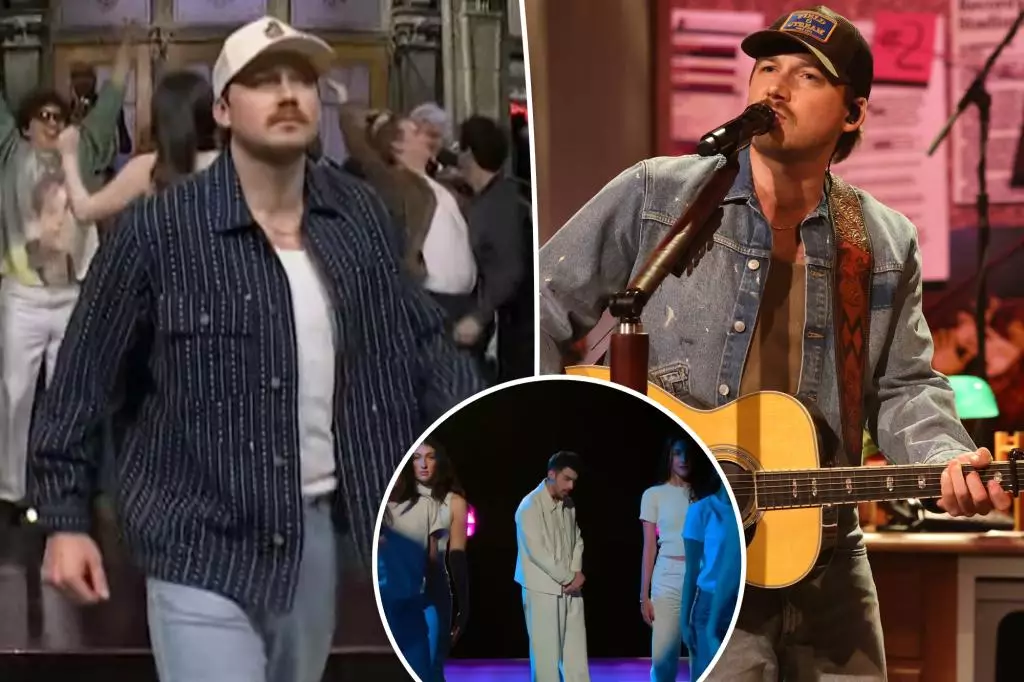In a surprising twist during the recent episode of “Saturday Night Live,” country star Morgan Wallen’s decision to withdraw from a sketch turned heads and raised eyebrows. His last-minute cancellation prompted musician and pop sensation Joe Jonas to step in, showcasing the unpredictable nature of live television. This situation raises essential questions about celebrity behaviors and the pressures of performing on such a storied platform. It appears that Wallen’s willingness to perform as the musical guest did not extend into being part of the hilarity, revealing a divide that may speak volumes about his current state of mind and public perception.
Behind the Curtain: Insights Into Wallen’s Conduct
Despite being a headliner with hits like “Whiskey Glasses,” Wallen’s demeanor during the show left much to be desired, as sources report he was “not super friendly” when interacting with the cast. This assessment suggests a possible disconnection or discomfort that he experienced while on set. The intricacies of performing at SNL are grueling; musicians like Wallen can quickly find themselves overshadowed by the vibrancy of the sketch cast, leading to the possibility that pressure to join in may have contributed to his hesitance. Indeed, the moments captured during the dress rehearsal, where he reportedly walked off, hint at a broader issue of how pressure affects individual performances.
Did the Pressure Get to Him?
It’s important to highlight the psychological demands placed upon celebrities in such high-stakes environments. Wallen’s abrupt exit from SNL’s stage during its closing credits has resulted in speculation regarding the singer’s mental readiness and comfort within the laughter-driven atmosphere. Given Wallen’s complicated relationship with fame—frequent headline-making incidents, coupled with public scrutiny—his reluctance might stem from an overwhelming sense of vulnerability. The narrative that he left without mingling with co-stars hints at a deeper emotional reaction to the scrutiny and expectations surrounding his role.
Joe Jonas: The Last-Minute Hero
On the other hand, Jonas’s spontaneous involvement underscores the camaraderie that can blossom amongst artists in the industry. Not only did he step in seamlessly, but his light-hearted contribution to the “Big Dumb Line” sketch exemplified the effortless blend of joy and anxiety that can often accompany on-screen performances. Jonas embodied a message of positivity, urging cast members to “believe in yourself,” which contrasts sharply with Wallen’s apparent reluctance. This contrast raises interesting discussions on how performers navigate their mental states, each responding to the industry’s emotional and social landscape in vastly different ways.
Public Perception: Forgiveness or Criticism?
As Wallen prepares for his next ventures post-SNL, public reception remains a double-edged sword. On one hand, his swift exit drew criticism; on the other, insiders confirmed there exists “no bad blood” between the show’s creators and Wallen, indicating that there is still a possibility for a future return. This dichotomy encapsulates the tension faced by celebrities caught between genuine personal challenges and the relentless public scrutiny of their actions.
With fans questioning whether Wallen had conflicts with cast members or simply preferred solitude, the dynamics of celebrity interactions raise compelling discussions about authenticity within the entertainment industry. As the audience grapples with telling the line between admiration and judgment, Wallen’s narrative continues to unfold, leaving room for both professional redemption and personal growth.
A Look Towards the Future
Emerging artists and established musicians alike will undoubtedly watch how Wallen’s brand evolves following this latest SNL spectacle. Will he emerge more grounded and adaptive, or will these moments serve as shackles that impede his growth? The music and entertainment industry craves authenticity, and Wallen’s journey highlights just how critical it is for artists to maintain a balance between public expectations and mental well-being. As we await his next chapter, it becomes essential to challenge the interpretation of celebrity encounters—offering a chance to reflect on the human experience amidst the limelight.

